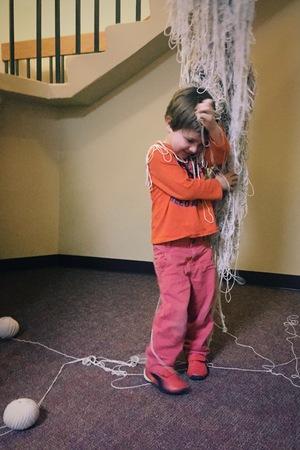Dear Bekah,
By now it is quite clear that the damage done to your sculpture was not as malicious as we originally suspected. I still feel compelled, however, to speak directly to you about what happened last Wednesday night. Your piece has joined a sad club of defaced art, bruised by anger, ignorance, and the inflated ego of a viewer. Unfortunately this kind of vandalism has a long history, both at Covenant and throughout art history. Many artists have had their works altered; some, like Leonardo DaVinci’s Mona Lisa, were attacked for nationalist reasons, while others, like Andres Serrano’s Piss Christ, were damaged by iconoclasts, who saw themselves as defenders of religious integrity. At Covenant, the Art Department underwent one of its darkest couple of months in 1996 when a drawing by Ed Knippers, Christ Answers Our Doubts, was slashed by an anti-abortion activist from the community. At the tail end of the culture wars, the vandalism forced Covenant and the PCA presbytery into a conversation on the place of religious art on our campus. Professor Kellogg defended Knippers’ work in a Bagpipe letter to the editor, telling students that the issue was not with the art on display, but rather pointed to “the larger problem of the pervasive ignorance in the church of matters relating to art and Western cultural history.”
I am not going to dive into the complex biblical debate Covenant entertained then, but I do see parallels between that conversation and the one we are having now. It seems to me that, in 1996, the student body, professors, and administration dealt with the offense on a primarily intellectual level, privileging theory and artist responsibility above extended, thoughtful engagement with the works themselves. We’re having a very different conversation today, and I was grateful at the overwhelming support you received from the news clip we released Thursday night. Faculty, staff, and students were grieved, and they worked together to understand what this meant for you and your work.
Miles Weichbrodt interacting with Bekah Meyer's, By Touch, the night of the opening. Photo by Dr. Elissa Weichbrodt
Miles Weichbrodt interacting with Bekah Meyer's, By Touch, the night of the opening. Photo by Dr. Elissa Weichbrodt
However, I know that not everyone was so moved, and there are some who still look at your piece with confusion, not yet understanding what your installation means for those of us who saw it in its fullness, not totally getting why our hearts were broken to see the piles of broken string lying in the stairwell.
By Touch transformed the stairwell from a pass-through to a place of contemplation. As we descend the stairway, we watch the tight, grid-like formation of string spiral into a tangled mass. The movement and lines of the soft string complement the rationality of the clean, triangle-shaped stairwell. You invited viewers to run their fingers through it. Like children playing with their mother’s hair, viewers tenderly caress the twists and knots. The piece truly evokes a maternal embrace, its tall body hovering over us, offering comfort and solace.
Someone took that experience, though, and they warped the meaning. Taking a ball of string and twisting it around the banister, they cut off access to the stairs and transformed the stairwell again, this time into a site of danger. I struggle to imagine the barred nature of those lines, a barrier created between the balusters, turning the work from an invitation into an obstacle. In order to restore the work’s relationship to its space and to maintain the safety of our community, it had to be cut. Thus, the string that had been a single strand, a seamless garment, was severed.
Looking at the small piles of broken string I’m reminded of the brokenness I experience in my mother’s arms now. We live in a disconnect as we wait to be fully restored. While I don’t want to give power to the people who destroy art for personal gain, their actions remind us of the inescapable pain we feel in this life. As I stand in the stairwell now, I am reminded of the destruction it took to restore our people, of a body broken so that we would experience ultimate comfort and new life.
I am sorry that this was done to you, Bekah. I am humbled by your work still and am excited to see where you go from here as an artist. I pray you continue to create work that helps us come to terms with the world as we find it, bringing beauty into mundane stairwells.
All my love,
Liz
















